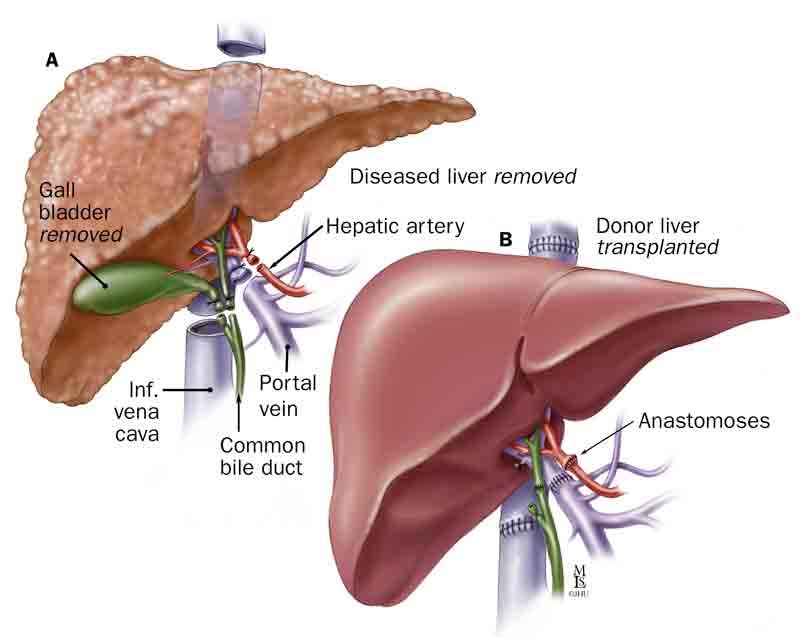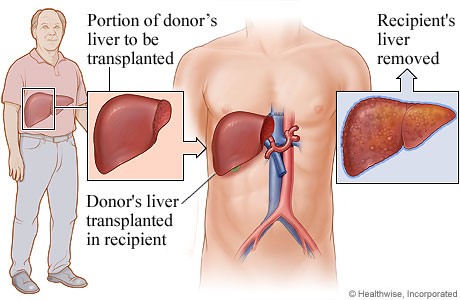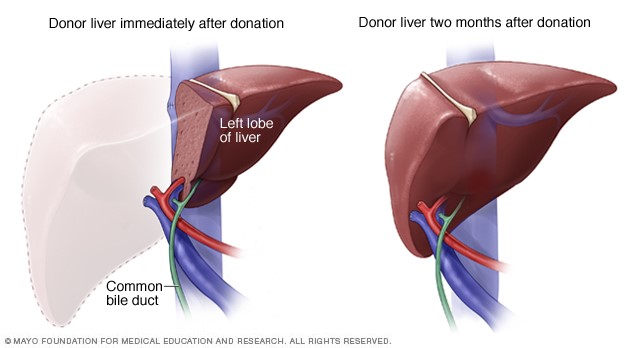Liver Transplant
Liver Transplant

The good thing about Liver is, it can continue to work even if it gets damaged a little. Unfortunately, Liver damage does not cause any explicit symptoms unless it progresses to a significant level; and the eating habits of modern day (junk food, high fat diet, carbonated beverages, alcohol etc.) are good ways to induce Liver problems. If the damage goes below a certain level, it may not be treatable and Liver transplant becomes the only option for survival. This calls for periodic clinical screening of the Liver to ensure its optimum working condition and make suitable changes to habits and lifestyle. People with following risk factors need to periodically check their Liver health to ward off future complications.
A liver transplant is a surgical procedure that removes a liver that no longer functions properly (liver failure) and replaces it with a healthy liver from a living or deceased donor. Your liver is your largest internal organ and performs several critical functions, including:
- Removing bacteria and toxins from the blood
- Preventing infection and regulating immune responses
- Processing nutrients, medications and hormones
- Producing bile, which helps the body absorb fats, cholesterol and fat-soluble vitamins
- Making proteins that help the blood clot
Liver transplant is usually reserved as a treatment option for people who have significant complications due to end-stage chronic liver disease. In rare cases, sudden failure of a previously normal liver may occur.
The human liver regenerates and returns to its normal size shortly after surgical removal of part of the organ. This makes living-donor liver transplant an alternative to waiting for a deceased-donor liver to become available.

Why It's done?
Normal liver vs. liver cirrhosis
Liver transplant is a treatment option for people with liver failure whose condition can’t be controlled other with treatments and for some people with liver cancer.
Liver failure may happen quickly or over a longer period of time. Liver failure that occurs quickly, in a matter of weeks, is called acute liver failure (fulminant hepatic failure) and is usually the result of medication-induced liver injury.
Although a liver transplant may treat acute liver failure, it is more often used to treat chronic liver failure. Chronic liver failure occurs slowly over months and years.
Chronic liver failure may be caused by a variety of conditions. The most common cause of chronic liver failure is scarring of the liver (cirrhosis), a process in which scar tissue replaces normal liver tissue and impairs liver function. Cirrhosis is the most frequently cited reason for a liver transplant.
Major causes of cirrhosis leading to liver failure and liver transplant include:
- Hepatitis B and C.
- Alcoholic liver disease.
- Nonalcoholic fatty liver disease.
- Genetic diseases affecting the liver (including hemochromatosis and Wilson’s disease).
- Diseases that affect the bile ducts (the tubes that carry bile away from the liver), such as primary biliary cirrhosis, primary sclerosing cholangitis and biliary atresia. Biliary atresia is the most common reason for liver transplant among children.
Liver transplant may also treat certain cancers that originate in the liver (primary liver cancers).
Recommended tests for Liver Health Evaluation:
Complete Blood Count This test is done to assess the quality of blood and its components. The test values may vary slightly depending upon age, gender and general condition. But, higher abnormalities may be an indication of potential health problems.

Blood Tests
Blood Sugar: Liver plays a vital role in glucose production and storage in our body. Hence, people with type-2 diabetes are greater risk of developing Liver conditions.
Urea nitrogen (BUN): When protein is broken down by Liver Urea is produced as a waste product, which in turn is excreted by Kidney. A reduced BUN level generally indicates deterioration in Liver function.
Liver Function Test (LFT)
This includes a set of investigations for the amount Liver enzymes known as ALT, AST and ALP in the blood. Typically these enzymes are not released directly into the blood. Hence, an elevated level of these enzymes in blood indicates some kind of damage to the liver.
Hepatitis – B Surface Antigen (HBsAg)
Positive test result shows infection with Hepatitis – B virus, which is the more common form of hepatitis.
Anti HCV
This test is done to check the presence of Hepatitis – C infection.
USG Abdomen
This test is performed to evaluate the health of the organs within the abdominal cavity. It is useful in detecting any structural abnormalities of the liver.

Aarav Medicare team is ready to look after all your medical emergency needs. We will Take care of your health.
Saurav
Why Aarav Medicare?

Highly Qualified Specialists
Best Specialist Doctors for all the Treatment and Procedures. Get Free Online Consutations.

State Of The Art Facility
Finest Hospitals with all the modern Medical Equipment and Best Patient Care.
